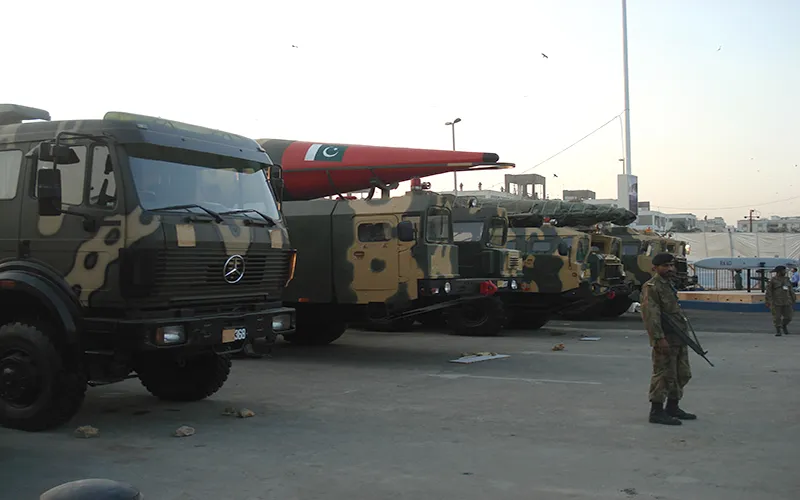Mark Fitzpatrick of the International Institute of Strategic Studies (IISS), London, makes a case for normalising nuclear Pakistan in his publication,
Overcoming Pakistan's Nuclear Dangers. In order to reduce a nuclear arms race in South Asia, he
argues that "Pakistan should be offered a formula for nuclear legitimacy," including a series of steps that Islamabad will be required to undertake such as signing of and ratifying the Comprehensive Test Ban Treaty (CTBT), shelving all fissile material production and ending its obstructionism in the Fissile Material Cut-Off Treaty (FMCT) negotiations. He argues that Pakistan undertaking these will strengthen its case for nuclear normalisation.
Toby Dalton and Michael Krepon made a similar pitch earlier this year in their report,
A New Normal Nuclear Pakistan. Krepon thereafter
wrote in the blog Arms Control Wonk that they "support Pakistan's quest to be viewed as a normal state that possesses nuclear weapons, and we support Pakistan's desire to gain entry into the Nuclear Suppliers Group. We also agree with Pakistan's view that the entry of new members that possess nuclear weapons ought to be criteria-based." There has been very little international support for Pakistan in this regard except of course from its long-term ally, China. The report in particular articulates five specific initiatives for Pakistan to consider that might change international opinion. In yet another
report authored by Toby Dalton, Mark Hibbs and George Perkovich a few years ago, there was a somewhat similar articulation, with the authors saying that "Pakistan's interests in legitimacy would be better served by a criteria-based approach within the NSG." The report published against the backdrop of the Chinese sale of two additional nuclear reactors (Chasma 3 & 4) to Pakistan, came up with ways to incentivize both China and Pakistan.
Reports such as these suggest a certain amount of effort to mainstream and place Pakistan on the same level as that of India. From the time the India-US nuclear agreement was signed, there have been repeated efforts by the Washington-based arms control lobby to equate Pakistan with India. However, it is difficult and even inconceivable to do this given the history of Pakistan's nuclear programme and its track record. India's entry into the Nuclear Suppliers Group (NSG) is being considered on the basis of its track record - not having engaged in proliferation of nuclear weapons or delivery mechanisms, despite the opportunity to do so. Others have argued that it is India's geopolitical clout that won it the nuclear deal and the NSG waiver. This is far from the truth. Even with the US championing India's case, the NSG would not have made the exception for India if it had a different proliferation history.
However, the efforts to mainstream nuclear Pakistan are now no more limited to think-tanks. According to some reports, the Obama Administration is in the process of seriously
exploring such options. These discussions are taking place against the backdrop of a fast-growing Pakistani nuclear arsenal - in fact, the fastest growing in the world. Islamabad is developing particularly dangerous systems such as tactical nuclear weapons. A nuclear deal with Pakistan would weaken the nuclear nonproliferation regime and contribute to possible destabilising developments in the regional context. However, the
joint White House press briefing by President Obama and Prime Minister Sharif contained no mention of a nuclear deal between the two. Instead, the statement simply referred to "Pakistan's efforts to improve its strategic trade controls and enhance its engagement with multilateral export control regimes." It was also emphasised that the "bilateral engagement in the Security, Strategic Stability and Non-Proliferation Working Group ? will continue ? to further build on the ongoing discussions in the working group."
By all means, Pakistan's integration into the global nuclear non-proliferation regime must be explored but the key problem with offering NSG membership to Pakistan is its obstructionist approach, which it has continued to display, for instance, on FMCT negotiations. The fact that the NSG functions on the principle of consensus means that any decision at the NSG that is even remotely perceived by Islamabad as advantageous to India could be potentially blocked by Pakistan. Pakistan's pursuit of parity with India will lead to a stalemate within the NSG.
Of course, it is not even clear that Pakistan would accept the kind of conditionalities that these analysts suggest. Moreover, the credibility of the Obama Administration to work out a strong deal is doubtful. The nuclear deal concluded with Iran is a case in point. Once the negotiations began, the US gave up on many of the critical demands it had originally made and eventually ended up with a deal that essentially legitimises an Iranian nuclear weapons programme. Better if Washington does not begin such negotiations.
(Dr. Rajeswari Pillai Rajagopalan is a Senior Fellow and Head of the Nuclear & Space Policy Initiative at Observer Research Foundation, Delhi)
The views expressed above belong to the author(s). ORF research and analyses now available on Telegram! Click here to access our curated content — blogs, longforms and interviews.

